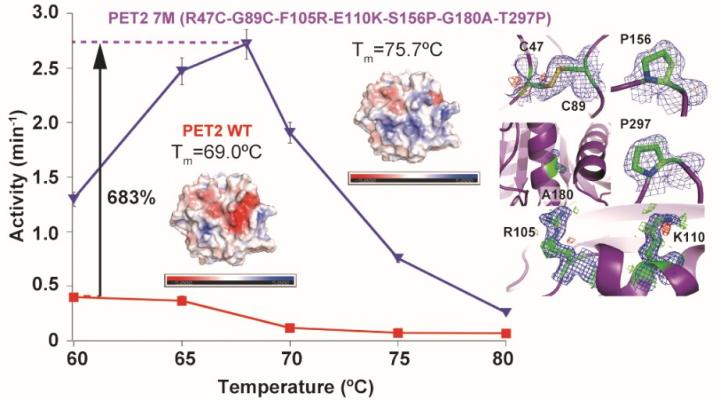
Credit: NINS/IMS
Cheap to produce and long to degrade, plastic was once a manufacturing miracle. Now, plastic is an environmental plague, clogging landfills and choking waterways. A Japan-based research team has turned back to nature to develop an approach to degrading the stubborn substance. Similar to how a protein binds to cellulose in plants or to chitin in crustaceans to initiate decomposition, an engineered protein is on its way to binding to plastic particles in an effort to more efficiently break them down.
They published their results on June 29 in ACS Catalysis, a journal of the American Chemical Society.
“Polyethylene terephthalate (PET) is produced and used in large quantities in modern society due to its low cost and ease of processing,” said paper author Ryota Iino, professor of the Institute for Molecular Science (IMS) in the National Institutes of Natural Sciences (NINS). “However, in recent years, from the perspective of realizing a sustainable society, the complete recycling of PET in industry and the removal of PET from the natural environment have become global issues. To resolve these issues, it is very important to understand how to degrade PET efficiently.”
The researchers investigated and engineered an enzyme cloned from a library of genetic materials collected from nature. This enzyme — called PET2 — was found to facilitate the degradation of PET by accelerating the reaction between PET’s chemical components and water.
Using single-molecule imaging analysis, the team found that the way the enzyme binds to the surface of PET actually limited the rate of degradation.
“We also revealed that by introducing positive charges on the surface of PET-degrading enzyme, the binding rate to the PET surface can be increased,” Iino said.
The positive charges react favorably to the PET surface, so more of the enzyme can bind and more effectively degrade the PET. The researchers also found that while engineered PET2 showed high thermal stability and highest activity at 68 degrees Celsius — slightly lower than most residential kitchen ovens can go — it may be more effective at higher temperatures where PET’s molecular bonds become more flexible and breakable.
“Our ultimate goal is to create a bacterium that can sense PET in the environment, move toward it, and degrade it,” Iino said. Such a bacterium would then be able to turn the degraded PET into energy useful for other organisms, effectively acting as an automated recycling center for plastic. “In nature, chitin and cellulose are recycled in this way.”
Iino is also affiliated with the School of Physical Sciences at The Graduate University for Advanced Studies (SOKENDAI). Other contributors include Akihiko Nakamura, Department of Applied Life Sciences, Faculty of Agriculture, Shizuoka University, and the Shizuoka Institute for the Study of Marine Biology and Chemistry; and Naoya Kobayashi and Nobuyasu Koga, Exploratory Research Center on Life and Living Systems (ExCELLS), NINS. Koga is also affiliated with IMS, NINS, and SOKENDAI.
The Leading Initiative for Excellent Young Researchers, the Ministry of Education, Culture, Sports, Science, and Technology of Japan, the Sumitomo Foundation, and the ExCELLS Special Collaboration Program supported this research.
###
Media Contact
Ryota Iino
[email protected]
Related Journal Article
http://dx.




